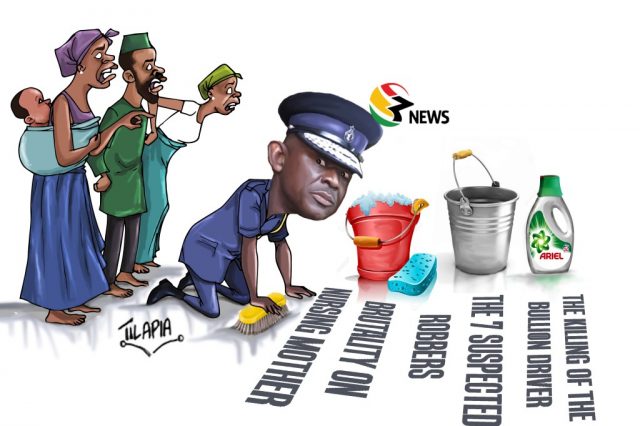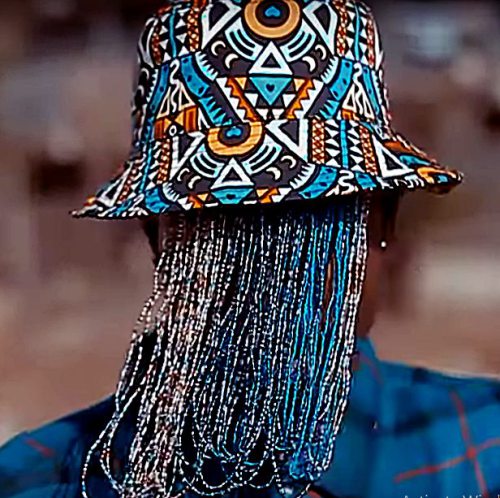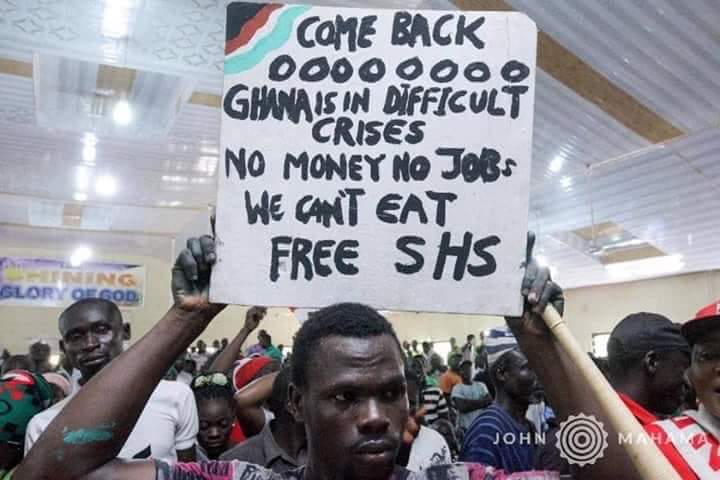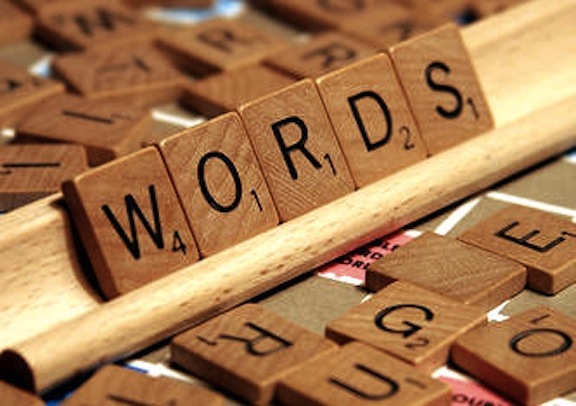
Image from: Tilapia / http://3news.com/cartoon-scrubbing-to-restore-public-confidence/
Growing up, one of the strategies some parents used to “put the fear of God” in us when we went wrong was to threaten a call to the police. “If you don’t finish your food, I will call for the police to come and catch you”, those who raised us would threaten. Stories were told of stubborn or rebellious children who were actually sent to the Police station by their parents or guardians, to be “shown where power lies”. Think about it: this is the case of a parent tapping into the long-standing image of the frightening police officer in order to get a kid to respond to instructions. There have been reports in the past about truant school children being flogged by some personnel of our various security services. When was this ever part of the guidelines of the Ghana Education Service? However, even if ‘calling in the police’ was just a scare tactic, such a disposition has contributed tangibly to, and is also a product of, our society’s conception of the police officer. In the minds of many a Ghanaian, a police officer, must be “feared”. As for soldiers, don’t even go there. Riding on this notion, Ghanaians have been bullied, manhandled, abused, and cheated by the very same people who should shield them from such nefarious acts. It was no wonder that many a time, the brawny and stout ones in our classes were considered as the best candidates to join the security forces. Whether these individuals had the passion and temperament to be police officers did not matter. Whether they had the right mental disposition to guard and protect others was rarely a feature on the checklist. All we cared for was the physique. Do you remember the four big boys the teacher would call for to hold your hands and feet before you were lashed? Those were automatic ‘talents’ for the police and military. Anyway, so the “young bullies” with the “perfect physique” get recruited into the Police Service. They are empowered with a Ghanaian badge of honour, armed with a weapon, andare unleashed to protect the people. However, they end up bullying with glee, extorting without remorse, and denying us all the opportunity to freely express our constitutional rights as citizens.. There are countless victims of cases of abuse by police officers. People have been wrongfully arrested, unduly detained, have had their premises ransacked without permits/warrants. Others have had their driver’s licenses or other such documents seized by police officers, or been subjected to physical and emotional abuse and maltreatments. The irksome part of it all is the silence of most victims in voicing out such injustices. But do we blame such victims in entirety? Alas! Whom do you report to, when the police officer (the one to enforce the law) is the perpetrator? Ergo, we keep mute over such brutalities, try to either “mind our own businesses” or “placate” the police officer, even when he is the erring party. We have, thus, collectively emboldened the policeman by subtly creating a generation of individuals who “fear the police”, and would cower at the mere sight of a police officer. Indeed, the strength of the oppressor is in the silence of the oppressed. Admittedly, my argument is not wholly representative of the police force in its entirety, it is nonetheless true that there is some truth in the nature of the historical relationship between civilians and the police force that I have sought to describe here. What then is the way forward? My humble thoughts are that we should spend a much longer time in training our security personnel. We cannot just recruit individuals, train them for a paltry six months, and entrust them with the essential duty of keeping the citizenry safe. I think it is about time we did more. I further suggest the study of human behaviour should form a focal part of the curriculum in the training of police officers. And while at it, we must begin to consciously enlighten ourselves as citizens that police officers are not to be feared. They should be respected and encouraged to carry out their professional duties, which is to protect lives and property and not to cause fear and panic.

by Selasi Komla Adjor
Educationist • Poet • Singer • Literary Blogger and Critic • Pragmatist






Very true. Continue with the good work.
Good write up.
You have said it all bro
Great write up.
You said it all bro
Nice one bro
Interesting thoughts; this issue needs to be addressed.
The Social Construction of the Ghanaian Police; in our present Ghana, ‘maybe’ with exception to the those who have chocked some milestones in academia, this strategy of ensuring children heed to instructions using the Police as a threat is fading, if not died. However, on the flip side of the coin where the Ghanaian Police who is to ensure the laws of the land are complied with, feels he owns the law, yields some superficial power and hence needs to be feared.
‘Knowledge, truly is POWER; Wisdom is DIVINE.’
Some officers are and have really marred this prestigious profession. We really have to sit up as a people. God bless our motherland, Ghana.
Mr A
djor de Poet…
What a way to reckon the good old days…
There are so many contributing factors which help to explain the Police’s cheesy image. The main ones are poor recruiting practices and lack of professional will by the leadership of the Ghana Police to resist attempt by politicians to dilute the Service with card- bearing party faithful who have been “forced” to enlist.
It is no longer news that some politicians forced them down the throat of the Police Service with, undedicated and low- grade persons into the black uniform. In most cases these are the ones who do most damage to the reputation of the Police.
The PsyChe of these guys should be considered as well. Most of them don’t have the temperament for the job. It is just an escape route for most of them. Thanks to unemployment.
Spot on, Selase. In dealing with the unprofessionalism of the police force, we also have to ensure the Police Intelligence and Professional Standard is a neutral and independent body from the police. Where we have the police being the body checking their own unethical acts, we can’t trust them to do a better work.